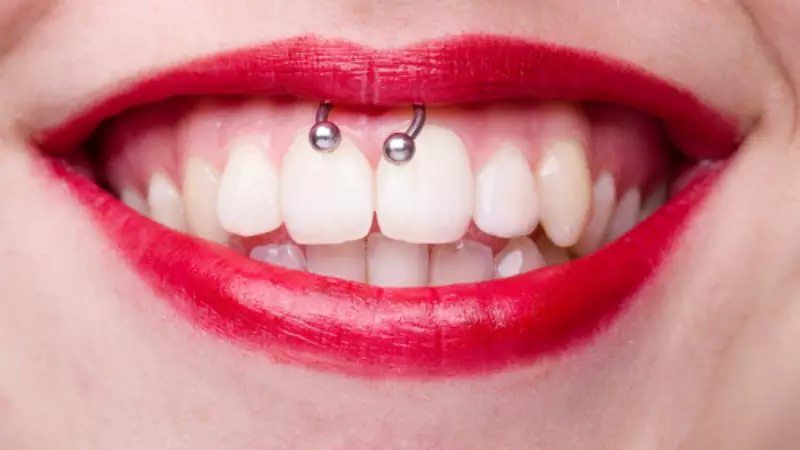- Hook: Oral piercings, from tongue rings to lip studs, have become popular forms of self-expression, but beneath their edgy appeal lie significant risks to your oral and overall health.
- Acknowledge: Many individuals underestimate the potential complications associated with these trendy adornments.
- State the post’s purpose: This comprehensive guide will explore the various types of oral piercings, detail the serious risks they pose to your teeth, gums, and soft tissues, and provide crucial advice on how to minimize potential complications if you choose to get one.
Popular Oral Piercings: What Are They?
- Types of Oral Piercings:
- Tongue Piercings: Most common.
- Lip Piercings: Labret, Monroe, Medusa.
- Cheek Piercings (Dimple Piercings).
- Uvula Piercings (less common).
- Frenum Piercings (e.g., smiley, frowny).
- Materials Used: Surgical stainless steel, titanium, gold, plastic (biocompatibility).
The Risks: How Oral Piercings Can Harm Your Mouth
- Infection:
- Mechanism: The mouth is full of bacteria; piercing creates an open wound. Risk is high.
- Symptoms: Swelling, redness, pain, pus, fever.
- Complications: Can lead to serious infections like endocarditis (heart valve infection), Ludwig’s angina (severe neck/jaw infection), or even brain abscesses.
- Damage to Teeth:
- Chipped or Cracked Teeth: From accidental biting on the jewelry during chewing, speaking, or sleeping.
- Enamel Wear: Constant rubbing of metal against tooth surfaces.
- Impact: Can lead to pain, sensitivity, need for fillings, crowns, or even extractions.
- Gum Recession:
- Mechanism: Jewelry constantly rubs against gum tissue, causing it to pull away from the teeth.
- Impact: Exposes tooth roots (leading to sensitivity, cavities on roots), makes teeth appear longer, increases risk of tooth loss.
- Soft Tissue Trauma:
- Swelling: Significant swelling of the tongue after piercing, potentially blocking the airway.
- Scar Tissue Formation.
- Nerve Damage: Lingual nerve damage from tongue piercing can cause numbness, altered taste, or difficulty moving the tongue.
- Excessive Bleeding: During or after the piercing, due to blood vessels in the tongue/lips.
- Interference with Oral Function:
- Speech Impediments: Lisping, difficulty pronouncing certain sounds.
- Chewing and Swallowing Difficulties: Especially initially.
- Allergic Reactions: To metal components of the jewelry.
- Increased Salivation: Initial reaction, can lead to drooling.
- Bad Breath: Jewelry can trap food particles and bacteria.
Minimizing Risks: If You Choose to Get a Piercing
- Choose a Reputable Professional Piercer:
- Certification and Licensing: Ensure they follow strict sterilization protocols.
- Hygiene Standards: Clean studio, single-use needles, proper waste disposal.
- Select Appropriate Jewelry:
- Material: Opt for high-quality, hypoallergenic materials (surgical stainless steel, titanium).
- Size and Fit: Initially longer jewelry for swelling, then downsize to prevent irritation.
- Strict Oral Hygiene During Healing:
- Antiseptic Mouthwash: Use a non-alcoholic, antimicrobial rinse after eating and before bed.
- Gentle Brushing: Around the piercing.
- Salt Water Rinses: Help with healing.
- Avoid Playing with the Piercing: Resist touching, biting, or clinking the jewelry against your teeth.
- Dietary Modifications (Initial Healing): Stick to soft, non-spicy foods, avoid hot drinks.
- Regular Dental Check-ups: Inform your dentist about the piercing. They can monitor for early signs of complications.
- Remove Jewelry for Sports: Use a mouthguard.
- Know When to Remove It: If complications arise (severe infection, persistent pain, gum recession).
Conclusion:
- Summarize: While oral piercings can be a form of personal expression, they come with a significant array of potential risks to your oral and overall health.
- Reiterate: Understanding these dangers and taking meticulous precautions is paramount if you choose to get one.
- Empower: Always prioritize your health, and consult with dental and medical professionals if any complications arise.
Related posts
1 Comment
Deixe um comentário Cancelar resposta
Meet the Author
Welcome to OdontoBlog, your essential source for current dental news and tips. Our goal is to simplify oral health, offering accurate and accessible information.
Popular Posts
Subscribe Now
* You will receive the latest news and updates on your favorite celebrities!



Such an important topic! Oral piercings may look cool, but it’s essential to understand the risks—like infections, gum recession, and tooth damage. Knowledge is key to making smart choices and protecting your oral health!